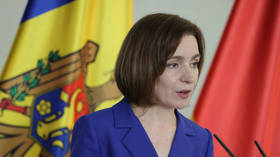Moldovan opposition rejects pro-EU president’s re-election
Maia Sandu has become the “president of the diaspora,” the Party of Socialists has said in a statement
Moldova’s biggest opposition party has challenged the results of the presidential runoff held on Sunday. The Party of Socialists said in a statement on Monday it does not recognize incumbent leader Maia Sandu’s victory and declared its own candidate and Sandu’s rival, Alexandr Stoianoglo, to be the “real winner.”
The nation’s Central Election Committee confirmed Sandu’s victory earlier on Monday.
The pro-Eu politician secured 55.35% of the votes, it said. Stoianoglo got 44.65%, according to official data. Early results suggested Stoianoglo was leading by a slim margin but the incumbent overtook him by midnight and the gap between the two kept growing. Moldovans living in Western Europe were instrumental in Sandu’s victory in both the first round of the presidential elections in October and in Sunday’s runoff, according to the media.
In its statement on Monday, the Socialists branded Sandu a “president of the diaspora” who was only recognized by “her sponsors and supporters abroad.” The party also said that it does not recognize the results of the voting abroad, which, it said, led Sandu to victory.
According to the party’s statements, more than 51% of Moldovans living inside the country supported Stoianoglo, making him “the president of the people.” The Socialists also pointed to what they described as numerous violations committed by the authorities during the vote. Alleged irregularities ranged from blocking voters’ access to the polling stations and illegal electoral agitation to the disappearance of ballot boxes and outright falsifications.
“Recent presidential elections … cannot be considered a free and democratic expression of the will of the people,” the statement said.
The party then vowed to develop a “strategy to depoliticize state institutions and ensure equal conditions in electoral campaigns” together with other political parties and defend the interests of all Moldovans, who had “expressed their will and made a free choice.” It still stopped short of announcing any specific measures in the wake of the vote.
Moldovan police said that a total of 225 violations were reported during the voting, ranging from ballot damage to illegal political agitation and voter bribing. Prior to the vote, Moldovan authorities claimed they’d found evidence of Russian attempts to interfere with the vote. The Kremlin strongly rejected these accusations.
After the first round, Sandu claimed that there was “clear evidence” of criminal groups supposedly colluding with “foreign forces hostile to our national interests” to meddle into the elections. Moscow then demanded she provide evidence to support her claims.
You can share this story on social media:








Comments are closed.